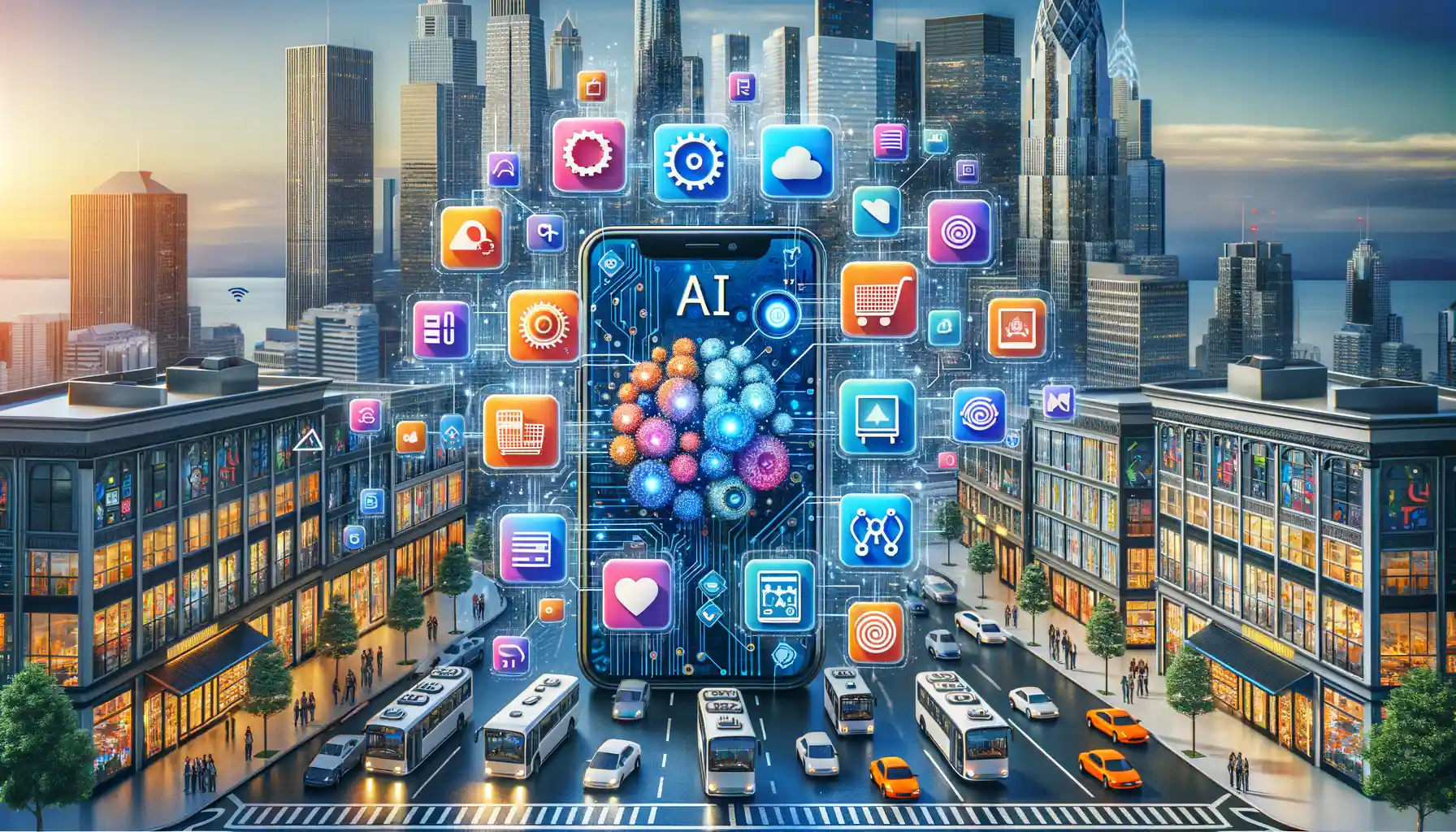Understanding the Role of AI in Modern Mobile App Startups
How AI is Transforming Mobile App Startups
Imagine launching a mobile app startup 10 years ago—you’d need a dream, a ton of caffeine, and pure human effort. But today? Enter Artificial Intelligence (AI), your tireless cofounder that never sleeps, never gets stressed, and always has data-driven solutions up its digital sleeve.
AI is no longer some distant future tech; it’s the secret sauce fueling some of the most successful startups. Let’s break it down:
- Customer Personalization: AI learns from user behaviors like Sherlock Holmes on a detective spree, tailoring experiences in real-time.
- Automation: From chatbots handling customer queries to predictive analytics, AI frees up humans to focus on the big picture.
- Smarter Decision-Making: With tools like machine learning, startups forecast trends and preempt obstacles with near-magical precision.
Startups like Spotify thrive because of recommendation engines powered by AI, while others use AI in areas you might not expect—like fraud detection or A/B testing millions of app designs. AI doesn’t just amplify what’s possible; it redefines how you even begin to strategize.
Why Understanding AI Isn’t Optional Anymore
Picture this: You’re building a house but don’t understand how bricks work. That’s modern startups without AI knowledge. It’s your foundation! Whether you’re a tech wizard or just dipping your toes in, getting a handle on AI could mean the difference between scaling rapidly or being left in the dust.
AI puts small startups on equal footing with giants. Why? Because it democratizes access to innovation. A solo developer with AI tools can compete with entire teams from yesteryears. Think of AI as your backstage crew, silently orchestrating success while you take the stage.
Understanding AI doesn’t mean becoming a programmer overnight. It’s about knowing what’s possible and asking the right questions. Once you see how AI enables hyper-efficiency and razor-sharp insights, it’s hard to imagine building a startup any other way.
Steps to Build a Mobile App Startup with AI Integration

Lay the Groundwork for Your AI-Powered App Dream
Building a mobile app startup isn’t just about coding—it’s like crafting a masterpiece from a blank canvas. Start by defining your purpose. What problem does your app solve? Imagine someone struggling to find healthy recipes tailored to their diet. If your app uses AI-powered personalization to recommend meals based on preferences, that’s your unique value.
Next, dive into market research. No shortcuts here—study competitors, interview future users, and analyze what’s already working. This step uncovers golden opportunities to make your app unforgettable. Need inspiration? Think of how apps like Duolingo transformed language learning with AI-driven feedback.
Once your crystal-clear idea takes shape, assemble a stellar team. Partner with developers, designers, and marketers who are as excited about AI as you are. Building with AI is collaborative—it’s not “me against the world” but “we’re rethinking the world together.”
The Practical Steps: Merging Creativity and Technology
When it’s time to bring your concept to life, follow these essential steps:
- Choose the right AI tools: Platforms like TensorFlow or OpenAI APIs can provide the foundation for efficient AI integration.
- Create a prototype: Don’t aim for perfection—aim for proof. Test core AI features with basic users to refine your approach.
- Iterate constantly: AI thrives on data, so continually improve your algorithms by studying user interactions and gathering feedback.
Remember, this journey is part art, part science. Take leaps of faith where necessary, but ground your decisions in data and strategy. That’s how successful startups rise above the noise.
Key AI Technologies to Enhance Your Mobile App

The AI Toolbelt: Must-Have Tech for Your App
Ready to supercharge your app? With the right AI technologies, you can do more than just impress users—you’ll redefine their expectations. Imagine turning your app into a digital assistant that anticipates users’ needs before they even realize them! Here’s how to make it happen:
- Natural Language Processing (NLP): This is the wizard behind chatbots and voice assistants like Siri. Want your app to understand slang, detect sentiment, or even translate languages on the fly? Enter NLP. It’s your key to meaningful, human-like conversations.
- Computer Vision: Transform your app into an eye with this technology. From scanning documents to recognizing faces for secure logins, it adds a dash of sci-fi magic users adore.
- Predictive Analytics: Think of this as your app’s crystal ball. By analyzing past user behaviors, predictive analytics can offer tailored recommendations—whether it’s the perfect playlist or must-have shopping suggestions.
Personalization: The Secret Sauce
Your users crave individuality—they want apps that feel made *just* for them. That’s where AI-powered personalization algorithms shine. Netflix does it with binge-worthy show suggestions. Spotify nails it with playlists like “Discover Weekly.” Now, it’s your turn. Inject these algorithms to track preferences and deliver experiences so seamless, they’ll feel custom-built.
But let’s not forget fraud detection! Apps handling payments or sensitive data can use Machine Learning systems to flag suspicious activities in real-time. The goal? Build trust, protect users, and keep your app out of tomorrow’s headlines.
Challenges and Solutions in Utilizing AI for Mobile Apps

The Hurdles That Keep You Awake at Night
The journey of integrating AI into mobile apps may feel like navigating a maze in pitch darkness. You’re not alone if you’ve encountered problems that make you wonder, “Is this even worth it?” A big one is the dizzying amount of data. AI thrives on it, but messy, unstructured, or insufficient data can stunt its magic. And let’s face it—cleaning up data is about as fun as untangling holiday lights.
Another challenge: the high cost of development. Crafting an AI-powered masterpiece can drain your resources before you even go live. Add to that the constant evolution of algorithms, and it feels like chasing a moving target. Oh, and we can’t ignore the fear of being labeled as ‘creepy’ when users realize how much your app *knows* about them. Striking the balance between personalization and privacy is like walking a tightrope over a canyon.
- Solution: Embrace pre-built AI tools like TensorFlow or Firebase ML Kit to lower costs and speed up development.
- Solution: Start small. Experiment with limited features before going all-in on AI integration.
Making It Work Without Breaking Your App (or Your Mind)
Let’s talk performance. AI models are resource-hungry beasts. Integrating them into a mobile app can lead to laggy user experiences—or worse, app crashes. Imagine spending months building an app only to have it freeze mid-scroll. It’s the stuff of nightmares.
Here’s the fix: use edge computing. Instead of sending every query to the cloud, move parts of the AI processing directly onto users’ devices. This reduces latency and saves bandwidth. And don’t forget to test like your app’s life depends on it (because it does). Simulate real-world conditions: poor network, high traffic, or even the dreaded “1% battery remaining.”
Whether it’s improving speed or making peace with ever-changing algorithms, tackling these challenges can feel overwhelming. But when you see users falling in love with your seamless, smart app? Totally worth it.
Future Trends of AI in Mobile App Startups

The AI Revolution: Transforming Customer Experience
Imagine a world where your mobile app feels like a personal concierge, always steps ahead of your needs. That’s the power of future trends in AI for startups. One key shift? Apps are moving beyond static interfaces to deliver hyper-personalized user journeys. For instance, AI-powered recommendation engines like those used by Spotify or Netflix are becoming even sharper, predicting what users want before they know it themselves.
Voice assistants, too, are evolving. Soon, your app might feature a conversational AI that doesn’t just answer questions but *understands emotions*. Emotional AI will analyze voice tones and word choices to deliver responses that actually feel human. It’s like talking to a best friend who just “gets” you!
- Behavior-based insights: Apps will anticipate behaviors and automate tasks based on patterns.
- Emotion detection: Facial recognition combined with AI could tailor content based on a user’s mood.
Smarter, Faster, and Always Adapting
The future is also about apps that learn as they grow. Consider self-improving algorithms; these won’t just fix bugs—they’ll rewrite their own code to optimize performance. Think of it like having an app that evolves alongside its users, staying relevant no matter how trends shift.
And for developers? AI deployment will become seamless. Tools like AutoML are already making waves, empowering startups with little coding knowledge to create machine-learning models. As barriers to entry shrink, innovation will grow exponentially—and let’s be honest, isn’t that exactly what the startup ecosystem thrives on?
